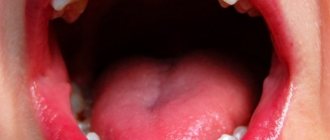An unpleasant odor emanating from the oral cavity causes psychological discomfort, reduces self-esteem, and can signal various pathologies in the body, systemic diseases, and physiological disruptions in the functioning of internal organs.
The reason does not always lie in insufficient hygiene or dental diseases. The smell of ammonia from the mouth in adults may indicate problems in the functioning of the digestive tract, impaired functioning of the kidneys, liver, as well as the presence of other health problems in a person.
Main nuances
“Bad breath is scientifically called “halitosis.” It can be physiological and pathological. In the first case, they usually talk about the “aroma” that appears in the morning and disappears after morning hygiene procedures. In the second case, the appearance of such a symptom has certain medical reasons,” says Evgenia Parshina. As the immunologist notes, smoking can, for example, influence the appearance of bad breath.
Among the main causes of halitosis is poor oral hygiene, when a person does not properly care for his teeth. It can also be caused by tooth decay or plaque on the tongue. The problem can also appear, as the immunologist notes, with chronic tonsillitis.
Question answer
Why does my breath smell bad in the morning? Also often the problem is caused by diseases of the gastrointestinal tract, for example a disease such as GERD (gastroesophageal reflux disease). Another reason could be the presence of Helicobacter pylori bacillus in the human body, says the immunologist.
Unpleasant odors from the mouth can be felt by a person suffering from diseases of the nasal cavity, which are accompanied by postnasal drip, as well as swelling of the mucous membranes and inflammation of the adenoids in children. “In children, by the way, an unpleasant smell from the nose can also appear against the background of foreign objects in the nose, which can remain in the nasal cavity for a long time,” says Evgenia Parshina.
Symptoms, diagnosis
Excess ammonia in the body can lead to a deterioration in general condition, malfunction of internal organs, slowdown of metabolism and metabolic processes at the cellular level. A person feels a sour-sweet taste, severe weakness, fatigue, irritability, and a deteriorating emotional state. Severe headaches, fever, sudden mood swings are possible.
A strong uremic odor from the mouth can occur in adults at any age. Only by establishing the root cause can you select adequate treatment and effective techniques that will restore fresh breath. It is necessary to undergo a comprehensive diagnostic examination at a medical center.
Important! Therapeutic methods and pharmacological agents should be prescribed by a doctor based on the diagnostic results. Self-medication can only aggravate the situation and lead to the development of serious complications and health problems.
It is necessary to undergo examination by a gastroenterologist, therapist, endocrinologist, or dentist. It is imperative to do an ultrasound of the internal organs, a general and biochemical blood test.
Diabetes
For example, Evgenia Parshina notes that with diabetes, a person can smell a fruity or apple aroma from himself. A similar manifestation is observed when following, for example, a keto diet. The smell of diabetes is quite characteristic, it is similar to the aroma of soaked, fermented apples and resembles acetone. In people suffering from diabetes, there is a sharp increase in blood glucose levels, and ketone bodies begin to be released. Under starvation conditions, cells begin to actively use fats and proteins, including those stored for future use by the body, and when they break down, acetone begins to appear.
Why appearances
Keep in mind! Ammonia is produced in the body during the breakdown of proteins and fats.
In a healthy person, this natural process ends very quickly; toxic breakdown products are easily eliminated from the body.
The smell of ammonia from the mouth indicates problems in the functioning of individual organs that cannot cope with toxins.
If ammonia cannot leave the body through the genitourinary system, it exits through the lungs. This is why the smell of ammonia comes from your mouth.
At best, the cause of an unpleasant odor may be improper oral care ; at worst, it may be the appearance of pathology .
In most cases, bad breath occurs as a result of diseases of the teeth and gums. Much less often, the cause lies in the pathology of the internal organs.
Main reasons
For your information! There are several known reasons for the appearance of ammonia odor from the mouth:
- Poor nutrition. Poor diet is one of the reasons for the appearance of uncharacteristic odors from the mouth. When there is a lack of nutrients in the body, the process of active breakdown of stored fats begins to replenish energy. Excess protein in the menu disrupts the functioning of the kidneys and liver due to overload. Improper functioning of these organs makes it difficult to remove ammonia from the body naturally. Excessive consumption of foods enriched with proteins causes rapid breakdown of fats, which means increased formation of ketone bodies. The body, not accustomed to such a load, cannot remove ketones in a timely manner; they accumulate in the body, causing an unpleasant odor.
- Restrictions on drinking and eating. For normal functioning of the kidneys, a large amount of water is required, if it is not enough, it means that it is difficult to remove waste products through the kidneys. This leads to stale breath from the mouth. Hunger forces the body to process stored fats and proteins to replenish missing nutrients. As a result, the level of ketone bodies in the blood increases significantly.
- Liver diseases. Ammonia is filtered through the liver and eliminated from the body by the urinary system. When liver function is impaired, the filtration of ammonia compounds slows down, which provokes the accumulation of ketones in the blood plasma.
- Taking medications that contain amino acids and nitrogen. Such drugs include:
- ACTI-5 is prescribed to children with growth retardation and poor appetite.
- Biotredin is used to improve performance.
- Glycine is prescribed for frequent stress, vegetative-vascular dystonia, lack of sleep, and alcoholism.
- Methionine is used in the treatment of kidneys and diabetes.
- Moriamin Forte is prescribed during pregnancy and lactation.
- Diabetes. The main characteristic of this disease is high blood glucose levels. Tissues cannot cope with the absorption of glucose, so the required amount of useful elements does not reach the cells. To replenish the required amount of vitamins and minerals, fats begin to break down at an accelerated pace, thereby forming much more ketone bodies. Ketones, when accumulated in the blood, have a toxic effect on the body, which leads to the appearance of an ammonia odor from urine, skin and breath.
- Kidney diseases such as nephrosis, renal dystrophy, renal failure. This leads to serious disruptions in the functioning of the renal tubules, due to which normal metabolism occurs. Pathological changes lead to the accumulation of ketone bodies.
- Thyrotoxicosis is a disease of the endocrine system, namely the thyroid gland, in which the level of thyroid hormone increases. This hormone is responsible for metabolism; its increase leads to faster metabolism. An accelerated metabolism affects weight loss.
Kidney problems
“Another chronic disease that can lead to the appearance of an unusual odor is kidney failure,” says Evgenia Parshina. Thus, with diseases of the urinary system, for example nephrosis, pyelonephritis, etc., manifestations of the smell of ammonia may be observed. Usually this kind of smell appears already in the terminal stage. The mechanism by which the odor appears is that the main source of ammonia is the catabolism of amino acids and the breakdown of other nitrogen-containing compounds in tissues, including the kidneys. An imbalance leads to the accumulation of a substance in the blood.
Salty taste. What diseases does this symptom indicate? More details
Treatment options
It is important to carry out periodontal treatment in a timely manner in order to prevent pathologies of the periodontal tissues. Healthy bone tissue, gums, and ligaments are the key to oral health. It is imperative to respond to such a signal as bad breath. By consulting a doctor, you can identify the exact cause of the disease. Diseases of the gastrointestinal tract, kidneys, and thyroid gland are treated by specialized specialists. Dental problems are solved by a dentist.
The ammonia smell, which is temporary, can be eliminated as follows:
- Drinking plenty of water;
- Cleaning your tongue and teeth;
- Adding carbohydrates to the menu;
Serious illnesses, such as diabetic ketoacidosis, are treated in a hospital. The patient is given insulin to save him from a coma.
Treatment in the clinic
Modern methods of dental treatment make it possible to achieve good results. The sooner the patient seeks help, the easier and faster the therapy will be. In addition to eliminating the underlying disease, treatment of bad breath is carried out with hexoral. The substance can inhibit many bacteria. Miramistin is widely used among bactericidal drugs. It fights gram-positive and negative microorganisms. They wash the bladder. A universal remedy is stopangin, which destroys bacteria, fungi, and infections. The drugs are prescribed by the attending physician.
Folk remedies
If your breath smells like ammonia, you can get rid of it after eliminating the disease. To freshen your breath:
- Changes in diet should be made.
- Rinse your mouth with a decoction of oak bark, chamomile, sage, and mint.
- You can use vegetable oil to rinse and then spit it out.
- Hydrogen peroxide and water are often used. The product kills bacteria and refreshes the oral cavity.
- Coffee beans quickly eliminate bad breath. You need to chew it, holding it in your mouth for a few minutes.
The patient should avoid excessive consumption of protein foods, alcohol-containing drinks, and tobacco.
Hyperthyroidism
The smell of iodine from the mouth also indicates problems in the body. Usually, when such a signal appears, doctors send the person to be checked for problems with the thyroid gland, in particular hyperthyroidism. It is this gland that is associated with iodine. When the body has a problem with the production of hormones, it does not have enough capacity to work properly and dispose of everything unnecessary and excess, the accumulation of substances begins. Hence the smell. Also, sometimes the appearance of an iodine odor indicates problems from taking hormonal medications. And sometimes it appears during tooth decay as an oxidative reaction.
Question answer
How to eliminate the smell of onions and garlic?
In what diseases is it observed?
It has been established that the smell of acetone can occur in the following diseases:
- poisoning;
- coma;
- kidney inflammation;
- kidney failure;
- hepatitis;
- cholecystitis;
- dehydration due to intestinal infections;
- diabetes;
- liver injuries.
When an unpleasant odor begins to bother you, you should make an appointment with a therapist. After examination, questioning and studying the test results, the doctor will be able to refer you to a specialized doctor - gastroenterologist, endocrinologist, neurologist, nephrologist.
If such a symptom appears, the doctor will definitely prescribe a blood and urine test for diagnostic purposes. Additionally, nasopharyngeal culture and CT may be required. The research results will help identify the cause and select the optimal treatment regimen.
Anemia
A metallic taste from the mouth indicates the development of anemia. It develops against the background of an increase in the concentration of metal ions in the body. With anemia, the transport of hemoglobin is impaired. It is also sometimes called iron. As a result, a complete imbalance of the human condition begins.
Naturally, such a problem should not be ignored: any manifestations of some foreign aroma should be determined by taking tests and consulting with a specialist. You can start with a therapist: he will be alert to a particular disease and will offer examination options, and then therapy. You cannot leave the situation to chance, hoping that it will go away on its own. After all, there is a risk of the pathological process turning into a chronic one: treating it, as we know, is much more difficult, longer and more expensive. And the result is unpredictable.
There are contraindications, you should consult your doctor
Other causes of urine odor from the mouth
Protein diets, prolonged fasting, monotonous, unbalanced nutrition, drinking a small amount of liquid per day often lead to disruption of water-salt and electrolyte balance. If a large amount of protein food enters the body, the load on the kidneys and liver increases significantly.
Medicines, protein complexes, and nutritional supplements can also cause bad breath. Especially if pharmacological preparations, mineral and vitamin complexes contain nitrogen-containing substances, amino acids, and proteins.
Abuse of alcohol, drugs, and bad habits lead to irreversible consequences in the body and provoke the development of various systemic pathologies and functional disorders.
A constantly emanating uremic aroma indicates a violation of biochemical processes in our body. Therefore, in order to eliminate and neutralize the stench, it is important to establish the root cause of ammonia “amber”.
Diagnosis and which doctor to contact
Stay up to date! To establish an accurate diagnosis, it is necessary to seek advice from a therapist, who will refer, if necessary, for additional examination to specialized specialists.
You will also need to take urine and blood tests .
Quite often, the doctor will refer you for an ultrasound examination of the pelvic organs and thyroid gland.
This is done in order to exclude pathologies of the genitourinary and endocrine systems.
How to determine if you have halitosis
There are several ways to check your breath for freshness yourself:
- Breathe into cupped palms and smell the exhaled air.
- Use a cotton pad to wipe the surface of the tongue and assess whether there is a smell.
- Lick a clean spoon or the back of your hand, let the saliva evaporate and smell the surface.
It is better to carry out such tests in the late afternoon, 2-3 hours after eating and, of course, before brushing your teeth. If you have halitosis, you will definitely feel it.
Metrogyl Denta® for inflammatory diseases of the oral cavity accompanied by halitosis
Since one of the causes of bad breath is inflammatory periodontal diseases2, one of the directions of therapy should be the treatment of inflammatory diseases of the oral cavity.
Dental gel Metrogyl Denta® is a drug that can be used for the treatment and prevention of most infectious and inflammatory diseases of the oral cavity, in particular gingivitis and periodontitis7. It contains two active antimicrobial components - the antibiotic metronidazole and the antiseptic chlorhexidine, which are effective against the main anaerobic bacteria that cause periodontal diseases7.
to come back to the beginning
Prevention of halitosis
- Choose a toothbrush with a suitable degree of hardness, change the hygiene accessory at least once every 3 months;
- use toothpaste without abrasive particles to prevent damage to the enamel;
- brush your teeth thoroughly twice a day;
- use dental floss, irrigator;
- rinse your mouth every time after eating;
- give up bad habits (smoking, alcohol, excessive coffee consumption);
- drink enough water to prevent dry mouth;
- reduce consumption of foods with strong aroma;
- do not forget to cleanse the tongue, paying attention to its root;
- visit the dentist regularly (every 6 months) for professional hygiene;
- promptly treat ENT pathologies and internal diseases;
- strengthen immunity;
- avoid stress and nervous tension;
- in case of chronic diseases of internal organs, pay attention to the prevention of complications and take prescribed therapy.
Expert of the article Bolshakova Evgenia Vladimirovna Dentist-hygienist
More than 11 years of experience










